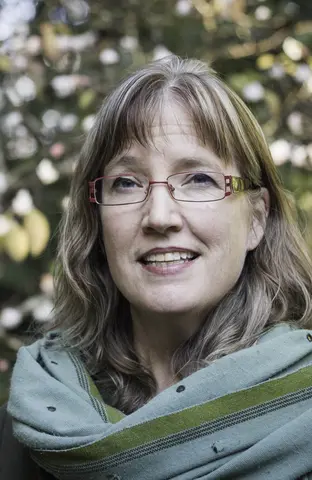Dr. Anne Murphy
anne.murphy@uni-erfurt.deFellow (Max Weber Centre for Advanced Cultural and Social Studies)
Visiting address
Max-Weber-Kolleg für kultur- und sozialwissenschaftliche Studien
Campus
Nordhäuser Str. 63
99089 Erfurt
Mailing address
Universität Erfurt
Max-Weber-Kolleg für kultur- und sozialwissenschaftliche Studien
Postfach 90 02 21
99105 Erfurt

Research interests
Dr. Murphy is associated with the ‘Religion and Urbanity: Reciprocal Formations’ Kollegforschungsgruppe directed by Susanne Rau and Jörg Rüpke at the Max Weber Centre for Advanced Cultural and Social Studies. Her research project at the Kolleg seeks to understand the articulation of religious identities in secondary urban centres, between the rural and the imperial centre, in North India in the early modern period. With this, she initiates a new book project exploring eighteenth-century Punjabi religious formations and their literary traces in relation to the natural and settled landscape of their production, emplotting the literary on the human urban/rural landscape to understand in new terms the emergence of Punjabi language as a literary medium primarily in religious, non-courtly contexts and at complex intersection with Persian and emerging vernaculars in early modern South Asia.
Selected publications
- Grieving for Pigeons: Twelve Stories of Lahore by Zubair Ahmed, translated by Anne Murphy. Athabasca University Press (2022, open access).
- “Modern Punjabi literature and the Spectre of Sectarian Histories” for special issue of the Cracow Indological Studies journal, vol. 23: History and Other Engagements with the Past in Modern South Asian Writing/s, co-edited by Piotr Borek and Monika Browarczyk. Vol. XXIII, 2 (2021): 91–118. https://doi.org/ 10.12797/CIS.23.2021.02.04
- “Sufis, Jogis, and the question of religious difference: Individualization in early modern Punjab through Waris Shah's Hīr.” In Religious Individualisations: Historical and Comparative Perspectives, editors Martin Fuchs, Antje Linkenbach, Martin Mulsow, Bernd-Christian Otto, Rahul Parson and Jörg Rüpke, 289-314. Berlin: de Gruyter, 2020. Open Access. https://www.degruyter.com/viewbooktoc/product/498381?rskey=qmtzPy&result=1 (https://doi.org/10.1515/9783110580853).
- Co-editor, with Dr. Anshu Malhotra (University of California, Santa Barbara) of a special issue of Sikh Formations: Religion, Culture, Theory 16: 1-2 (2020), Bhai Vir Singh (1872-1957): Rethinking Literary Modernity in Colonial Punjab. DOI: https://doi.org/10.1080/17448727.2019.1674513.
- “Punjabi in the (late) Vernacular Millennium.” In Early Modern India: literature and images, texts and languages, edited by Maya Burger & Nadia Cattoni, 305-328. Heidelberg, Berlin: CrossAsia-eBooks, 2019. Open Access. https://crossasia-books.ub.uni-heidelberg.de/xasia/reader/download/387/387-43-84778-1-10-20190502.pdf
- “Configuring community in colonial and pre-colonial imaginaries: Insights from the Khalsa Darbar records.” In Religious Interactions in Modern India, Martin Fuchs and Vasudha Dalmia, eds, 165-187. Delhi: Oxford University Press, 2019.
- “At a Sufi-Bhakti Crossroads: Gender and the politics of satire in early modern Punjabi Sufi literature,” Archiv orientální (Journal of African and Asian Studies) 86 (2018): 243-268. Open Access. http://hdl.handle.net/2429/74587
- “Thinking beyond Aurangzeb and the Mughal State in a late 18th century Punjabi Braj source,” Journal of the Royal Asiatic Society, Series 28, 3 (2018): 537-554.
- “Writing Punjabi Across Borders,” South Asian History and Culture 9, 1 (2018): 68-91.
- Partition and the Practice of Memory. Edited with Churnjeet Mahn (University of Strathclyde, Glasgow, Scotland). London: Palgrave UK, 2018.
- Co-editor of a special issue of the Journal of the Royal Asiatic Society 28, 3 (2018) with Heidi Pauwels (University of Washington) entitled "From Outside the Persianate Center: Vernacular Views on Ālamgīr."
- “Placing Max Arthur Macauliffe in context(s): Sikh historiographical traditions and colonial forms of knowledge,” Journal of the Irish Society for the Academic Study of Religions, 4 (2017): 58-73. https://jisasr.org/current-issue-volume-4-2017/
- “Dissent and Diversity in South Asia Religions.” In The Management of Intramural Dissent on Core Beliefs (Cambridge Univ. Press), edited by Simone Chambers & Peter Nosco, 158-185. Cambridge: Cambridge University Press, 2015.
- The Materiality of the Past: History and Representation in Sikh Tradition New York: Oxford University Press, 2012; New Delhi: Oxford University Press, 2013.
- Time, History, and the Religious Imaginary in South Asia. London: Routledge, 2011.
- “The Guru’s Weapons,” The Journal of the American Academy of Religion 77, 2 (June 2009): 1-30.
- “History in the Sikh Past,” History and Theory 46, 2 (October 2007): 345-365.

